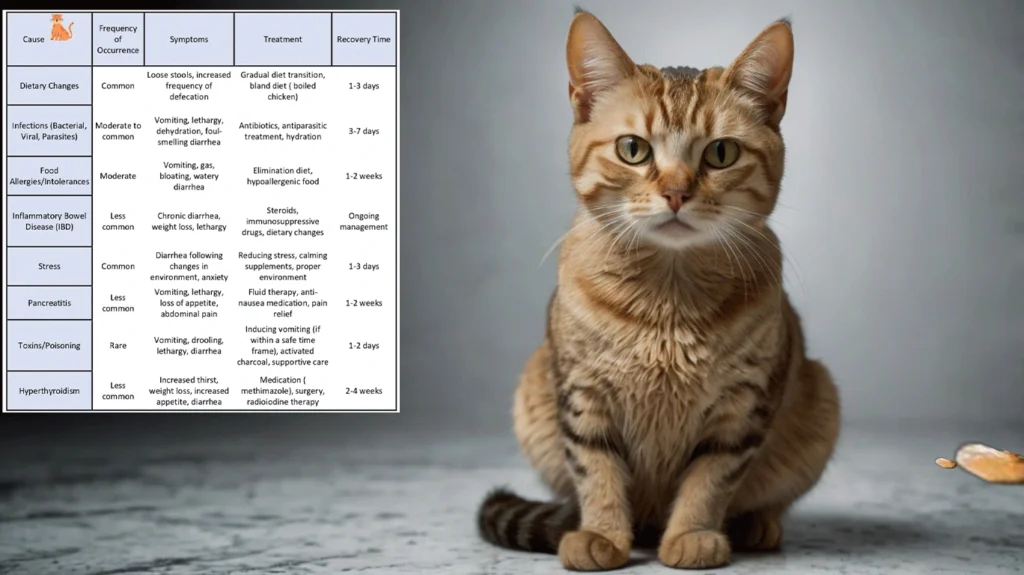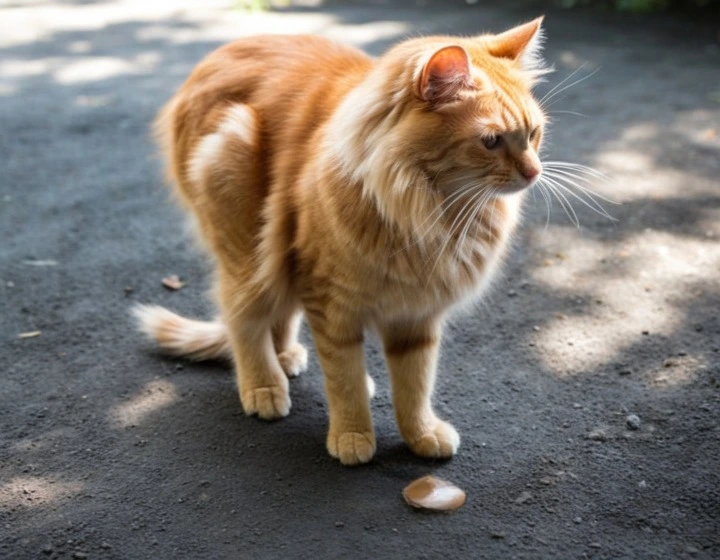Cat Diarrhea: Shocking Truth About Essential Causes and Urgent Care Tips

Introduction
Your cat’s health is a top priority, but what happens when your furry friend has diarrhea? It’s not just messy and unpleasant; it could also signal a deeper issue. Understanding the causes and learning how to address cat diarrhea promptly can make all the difference for your pet’s comfort and well-being.
In this article, you’ll uncover everything you need to know about cat diarrhea: its essential causes, urgent care tips, and steps to prevent it from happening again. Whether it’s your adult cat or a kitten experiencing loose stools, this guide is tailored for you.
Table of Contents
Key Takeaways
- Cat diarrhea is a common issue that can range from mild to severe, depending on the cause.
- Potential triggers include dietary changes, infections, stress, or underlying health conditions.
- Timely care is crucial to prevent dehydration and other complications.
- Understanding when to seek veterinary help can save your cat’s life.
What Is Cat Diarrhea?
Cat diarrhea refers to frequent, loose, or watery stools. While occasional diarrhea isn’t unusual, persistent or severe cases require attention.
Common Signs Your Cat Has Diarrhea
- Frequent trips to the litter box
- Watery or soft stool
- Accidents outside the litter box
- Increased urgency to defecate
- Foul-smelling stools
- Possible blood or mucus in the stool
Pro Tip: Always monitor your cat’s litter box habits to catch symptoms early.
Common Causes of Cat Diarrhea
Understanding the root cause is key to resolving diarrhea. Here are the most common culprits:
Dietary Causes
- Sudden dietary changes: Switching your cat’s food abruptly can upset their stomach.
- Food intolerance or allergies: Ingredients like dairy, grains, or certain proteins can trigger loose stools.
- Spoiled food: Consuming expired or contaminated food might cause gastrointestinal distress.
Parasitic Infections
- Worms: Roundworms, hookworms, or tapeworms are common in cats.
- Giardia: A microscopic parasite often found in contaminated water.
Bacterial and Viral Infections
- Salmonella or E. coli: Usually contracted from raw food or infected prey.
- Feline panleukopenia virus: A severe and life-threatening viral infection.
Stress and Anxiety
Cats are sensitive creatures, and stress from a new environment, addition of a pet, or loud noises can lead to diarrhea.
Chronic Conditions
- Inflammatory Bowel Disease (IBD): A common cause of chronic diarrhea.
- Hyperthyroidism: Often linked to gastrointestinal issues in older cats.
- Kidney or liver disease: Can affect digestion and stool consistency.
When Should You Worry About Cat Diarrhea?

Warning Signs to Watch For
- Dehydration: Look for dry gums or lethargy.
- Blood in stool: Indicates a serious issue.
- Prolonged diarrhea: Lasting more than 48 hours.
- Vomiting alongside diarrhea: Can quickly lead to dehydration.
Urgent Tip: Contact your vet immediately if your kitten has diarrhea, as they’re more vulnerable to dehydration and malnutrition.
Immediate Care for Cat Diarrhea
Step 1: Provide Plenty of Water
Diarrhea causes fluid loss, so keeping your cat hydrated is critical. Use fresh water or cat-safe electrolyte solutions.
Step 2: Adjust Their Diet
- Temporarily switch to a bland diet such as boiled chicken and plain white rice.
- Avoid treats or fatty foods.
- Gradually reintroduce their regular food once symptoms improve.
Step 3: Monitor Their Behavior
Keep a close eye on your cat’s appetite, energy level, and litter box habits. Record any unusual changes to share with your vet.
When to Visit the Vet
If home care doesn’t resolve the issue within 24-48 hours, or if your cat exhibits severe symptoms, it’s time to see a vet. Diagnostic tests may include:
- Fecal examination to check for parasites
- Blood tests to identify infections or organ dysfunction
- Ultrasounds to detect abnormalities in the gastrointestinal tract
Expert Quote: “Early intervention can save your cat from serious complications. Never ignore persistent diarrhea.” – Dr. Jane Smith, DVM.
Preventing Cat Diarrhea
Tips to Keep Your Cat Healthy
- Gradual dietary transitions: Introduce new foods slowly.
- Regular deworming: Prevent parasitic infections.
- Maintain a stress-free environment: Use calming sprays or routines.
- Avoid human foods: Many are toxic to cats.
- Keep vaccinations up to date: Protect against infections.
FAQ About Cat Diarrhea
Q: Why does my kitten have diarrhea?
A: Kittens often experience diarrhea due to diet changes, parasites, or infections. Their developing immune systems make them more vulnerable.
Q: Can stress cause diarrhea in cats?
A: Yes, stress is a significant trigger for diarrhea in cats. Identifying and minimizing stressors can help.
Q: Should I feed my cat during diarrhea?
A: Offer a bland diet and ensure hydration. Avoid regular food until symptoms subside.
Conclusion
Dealing with cat diarrhea can be stressful, but knowing how to identify causes, provide immediate care, and prevent recurrence empowers you as a pet owner. Remember, if symptoms persist or worsen, don’t hesitate to seek veterinary help.
Your next step? Keep an eye on your cat’s health, implement preventive measures, and always have your vet’s contact information handy. Your furry friend depends on you for their well-being!
